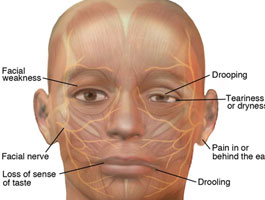Best Physiotherapy Clinic & Rehabilitation Center
Provide best quality healthcare for you
- High Quality
We take a goal-oriented approach to healing... - Patient Care
We’ll provide hands-on treatment in the office and education... - Professional Service
Our five physical therapists have a combined 120 years...

Bell's Palsy

Bell's palsy is a form of facial paralysis resulting from a dysfunction of the cranial nerve VII (the facial nerve) causing an inability to control facial muscles on the affected side.
Bell's palsy is defined as a one sided facial nerve paralysis of unknown cause. Several other conditions can also cause facial paralysis, e.g., brain tumour, stroke, myasthenia gravis, and Lyme disease; however, if no specific cause can be identified, the condition is known as Bell's palsy. It is thought that an inflammatory condition leads to swelling of the facial nerve. The nerve travels through the skull in a narrow bone canal beneath the ear. Nerve swelling and compression in the narrow bone canal are thought to lead to nerve inhibition, damage or death.
Bell's palsy is the paralysis or severe weakness of the nerve that controls the facial muscles on the side of the face - the facial nerve or seventh cranial nerve. Patients typically find they suddenly cannot control their facial muscles, usually on one side.
What are the symptoms of Bell's palsy?
The facial nerves control blinking, opening and closing of the eyes, smiling, salivation, lacrimation (production of tears), and frowning. They also supply the stapes muscles with nerves. The stapes is a bone in the ear which is involved in our ability to hear. When the facial muscle malfunctions, the following symptoms may emerge - symptoms of Bell's palsy:
Sudden paralysis/weakness in one side of the face.
It may be difficult or impossible to close one of the eyelids.
Irritation in the eye because it does not blink and becomes too dry. Changes in the amount of tears the eye produces.
Parts of the face may drop, such as one side of the mouth.
Drooling from one side of the mouth. The amount of saliva produced changes.
Difficulty with facial expressions.
Sense of taste may become altered.
An affected ear may lead to sensitivity to sound (hyperacusis). Sounds seem louder.
Pain in front or behind the ear on the affected side.
Headache.
HOW IS IT TREATED?
Most people who have Bell's palsy recover completely, without treatment, in 1 to 2 months. This is especially true for people who can still partly move their facial muscles. But a small number of people may have permanent muscle weakness or other problems on the affected side of the face.
You may need to take a corticosteroid. This medicine can lower your risk for long-term problems from Bell's palsy. Your doctor may also have you take antiviral medicine, such as acyclovir. Antiviral medicines used alone don't help with Bell's palsy.
Bell's palsy is defined as a one sided facial nerve paralysis of unknown cause. Several other conditions can also cause facial paralysis, e.g., brain tumour, stroke, myasthenia gravis, and Lyme disease; however, if no specific cause can be identified, the condition is known as Bell's palsy. It is thought that an inflammatory condition leads to swelling of the facial nerve. The nerve travels through the skull in a narrow bone canal beneath the ear. Nerve swelling and compression in the narrow bone canal are thought to lead to nerve inhibition, damage or death.
Bell's palsy is the paralysis or severe weakness of the nerve that controls the facial muscles on the side of the face - the facial nerve or seventh cranial nerve. Patients typically find they suddenly cannot control their facial muscles, usually on one side.
What are the symptoms of Bell's palsy?
The facial nerves control blinking, opening and closing of the eyes, smiling, salivation, lacrimation (production of tears), and frowning. They also supply the stapes muscles with nerves. The stapes is a bone in the ear which is involved in our ability to hear. When the facial muscle malfunctions, the following symptoms may emerge - symptoms of Bell's palsy:
Sudden paralysis/weakness in one side of the face.
It may be difficult or impossible to close one of the eyelids.
Irritation in the eye because it does not blink and becomes too dry. Changes in the amount of tears the eye produces.
Parts of the face may drop, such as one side of the mouth.
Drooling from one side of the mouth. The amount of saliva produced changes.
Difficulty with facial expressions.
Sense of taste may become altered.
An affected ear may lead to sensitivity to sound (hyperacusis). Sounds seem louder.
Pain in front or behind the ear on the affected side.
Headache.
HOW IS IT TREATED?
Most people who have Bell's palsy recover completely, without treatment, in 1 to 2 months. This is especially true for people who can still partly move their facial muscles. But a small number of people may have permanent muscle weakness or other problems on the affected side of the face.
You may need to take a corticosteroid. This medicine can lower your risk for long-term problems from Bell's palsy. Your doctor may also have you take antiviral medicine, such as acyclovir. Antiviral medicines used alone don't help with Bell's palsy.





